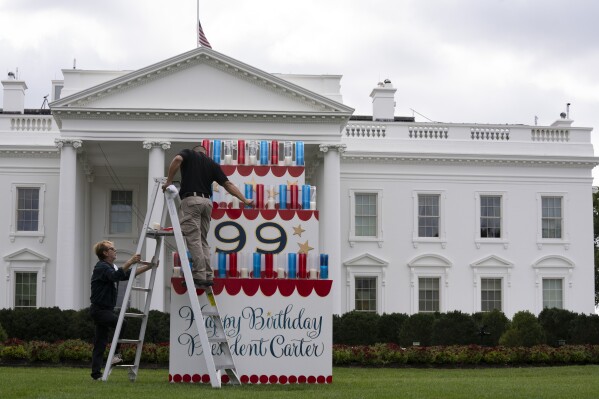A judge has declined to block parts of Georgia’s election law while legal challenges play out
ATLANTA (AP) — A federal judge in Georgia has declined to block several provisions of a sweeping election law while legal challenges play out.
Several voting advocacy and civil rights groups, as well as the U.S. Department of Justice, sued in 2021 after Republican state lawmakers passed the measure less than six months after former President Donald Trump narrowly lost the state and made false claims about widespread election fraud.
The lawsuits assert that parts of the law deny Black voters equal access to voting and violate the U.S. Constitution and the federal Voting Rights Act.
“Plaintiffs have not shown, at least at this stage of the proceedings, that any of the provisions have a disparate impact on black voters,” U.S. District Judge J.P. Boulee wrote in an order issued Wednesday. He also wrote that he “cannot find that Plaintiffs have presented enough evidence to show that the Legislature foresaw or knew that S.B. 202 would have a disparate impact on minority voters.”
 Georgia political group launches ads backing Gov. Brian Kemp’s push to limit lawsuits
Georgia political group launches ads backing Gov. Brian Kemp’s push to limit lawsuits
 Jimmy Carter turns 99 at home with Rosalynn and other family as tributes come from around the world
Jimmy Carter turns 99 at home with Rosalynn and other family as tributes come from around the world
 A Georgia state senator indicted with Trump won’t be suspended from office while the case is ongoing
A Georgia state senator indicted with Trump won’t be suspended from office while the case is ongoing
The voting advocacy and civil rights groups expressed disappointment in Boulee’s ruling, which means the challenged provisions of the law will remain in effect for the 2024 election cycle. But they pointed out that it was a preliminary decision and said they will continue to fight.
“The fight for voting rights in the South has never been easy, especially for Black voters. We will never stop advocating on behalf of our clients and voters across the state. We look forward to presenting our case at trial,” Rahul Garabadu, an attorney with the American Civil Liberties Union of Georgia, said in a news release.
Georgia Secretary of State Brad Raffensperger, a Republican who has defended the law, celebrated Boulee’s ruling.
“Today, the Court confirmed what we’ve been saying all along,” he said in a news release, adding that the law “strengthens election integrity while increasing the opportunity for Georgia voters to cast a ballot.”
The plaintiffs had asked Boulee to block five challenged provisions of the law while the litigation over their lawsuits unfolded.
One provision says that absentee ballot drop boxes must be located indoors, can be available only during early voting hours, and must be under constant human supervision.
Another provision prohibits the distribution or food, drink and other items to people waiting in line at polling places. The third provision says absentee ballots can be requested no later than 11 days prior to an election.
The fourth provision says that provisional ballots cast at the wrong precinct cannot be counted if they are case prior to 5 p.m. on Election Day. The final provision requires that a voter provide their driver’s license or state ID card number when requesting an absentee ballot.
In explaining his analysis, Boulee pointed to some steps that have been taken in the state, including some provided for in the challenged election law, that were supported by Democrats and that make it easier for people to vote.
Disclaimer: The copyright of this article belongs to the original author. Reposting this article is solely for the purpose of information dissemination and does not constitute any investment advice. If there is any infringement, please contact us immediately. We will make corrections or deletions as necessary. Thank you.




